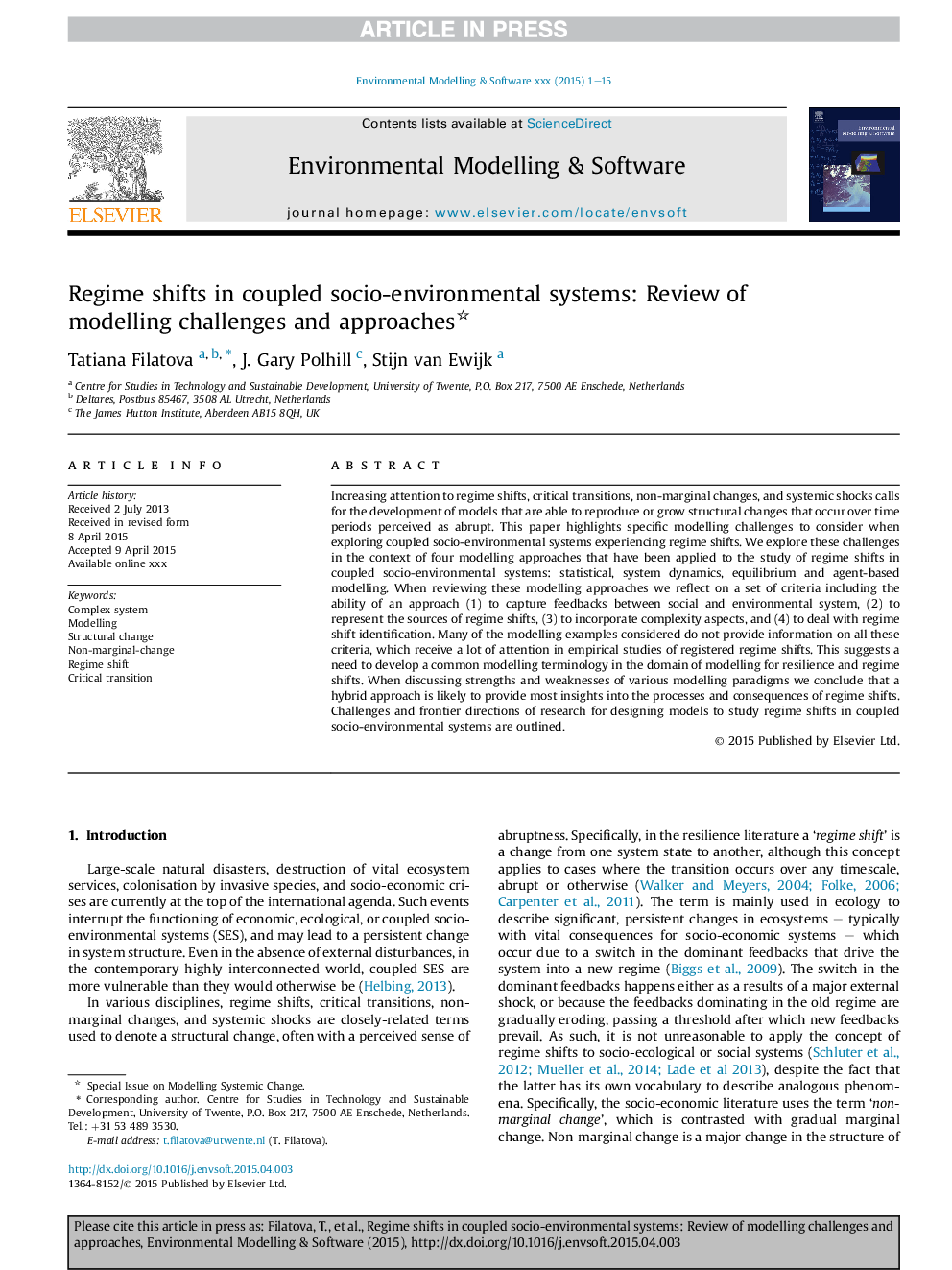| کد مقاله | کد نشریه | سال انتشار | مقاله انگلیسی | نسخه تمام متن |
|---|---|---|---|---|
| 6962677 | 1452275 | 2016 | 15 صفحه PDF | دانلود رایگان |
عنوان انگلیسی مقاله ISI
Regime shifts in coupled socio-environmental systems: Review of modelling challenges and approaches
ترجمه فارسی عنوان
تغییر رژیم در سیستم های اجتماعی و محیطی مرتبط: بررسی چالش ها و رویکردهای مدل سازی
دانلود مقاله + سفارش ترجمه
دانلود مقاله ISI انگلیسی
رایگان برای ایرانیان
کلمات کلیدی
سیستم پیچیده مدل سازی، تغییر ساختار تغییر غیرمحدود، تغییر رژیم، انتقال انتقادی،
ترجمه چکیده
افزایش توجه به تغییرات رژیم، تغییرات بحرانی، تغییرات غیر لرزان و شوک های سیستمیک، باعث ایجاد مدل هایی می شود که قادر به تولید یا رشد تغییرات ساختاری هستند که در دوره های زمانی که ناگهان درک می شوند رخ می دهد. این مقاله چالش های مدل سازی خاص را در هنگام بررسی سیستم های اجتماعی-محیطی که در حال تغییر رژیم هستند مورد بررسی قرار می دهد. ما این چالش ها را در زمینه چهار رویکرد مدل سازی که برای مطالعه تغییرات رژیم در سیستم های اجتماعی-محیطی مرتبط شده است: آماری، دینامیک سیستم، تعادل و مدل سازی مبتنی بر عامل استفاده می کنیم. هنگام بررسی این رویکردهای مدل سازی، ما بر روی مجموعه ای از معیارهای شامل توانایی یک رویکرد (1) برای تسریع بازخورد بین سیستم اجتماعی و محیط زیست، (2) نمایندگی منابع تغییرات رژیم، (3) ترکیب جنبه های پیچیدگی، و (4) برای مقابله با شناسایی تغییر رژیم. بسیاری از نمونه های مدل سازی در نظر گرفته شده در مورد تمام این معیارها اطلاعاتی ارائه نمی دهند که در مطالعات تجربی تغییرات رژیم ثبت شده توجه زیادی می شود. این نشان دهنده نیاز به توسعه اصطلاحات رایج مدل سازی در زمینه مدل سازی برای انعطاف پذیری و تغییرات رژیم است. هنگام بحث در مورد نقاط قوت و ضعف پارادایم های مختلف مدل سازی، نتیجه می گیریم که رویکرد ترکیبی احتمالا بیشتر بینش ها را در مورد فرایندها و پیامدهای تغییرات رژیم ارائه می دهد. چالش ها و مرزهای مسیر تحقیق برای طراحی مدل برای مطالعه شیفت های رژیم در سیستم های اجتماعی-محیطی مرتبط شده است.
موضوعات مرتبط
مهندسی و علوم پایه
مهندسی کامپیوتر
نرم افزار
چکیده انگلیسی
Increasing attention to regime shifts, critical transitions, non-marginal changes, and systemic shocks calls for the development of models that are able to reproduce or grow structural changes that occur over time periods perceived as abrupt. This paper highlights specific modelling challenges to consider when exploring coupled socio-environmental systems experiencing regime shifts. We explore these challenges in the context of four modelling approaches that have been applied to the study of regime shifts in coupled socio-environmental systems: statistical, system dynamics, equilibrium and agent-based modelling. When reviewing these modelling approaches we reflect on a set of criteria including the ability of an approach (1) to capture feedbacks between social and environmental system, (2) to represent the sources of regime shifts, (3) to incorporate complexity aspects, and (4) to deal with regime shift identification. Many of the modelling examples considered do not provide information on all these criteria, which receive a lot of attention in empirical studies of registered regime shifts. This suggests a need to develop a common modelling terminology in the domain of modelling for resilience and regime shifts. When discussing strengths and weaknesses of various modelling paradigms we conclude that a hybrid approach is likely to provide most insights into the processes and consequences of regime shifts. Challenges and frontier directions of research for designing models to study regime shifts in coupled socio-environmental systems are outlined.
ناشر
Database: Elsevier - ScienceDirect (ساینس دایرکت)
Journal: Environmental Modelling & Software - Volume 75, January 2016, Pages 333-347
Journal: Environmental Modelling & Software - Volume 75, January 2016, Pages 333-347
نویسندگان
Tatiana Filatova, J. Gary Polhill, Stijn van Ewijk,
